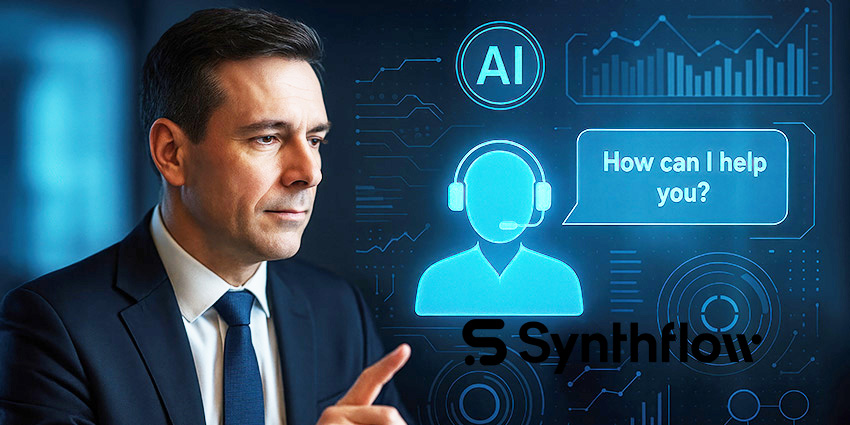As the development of AI and machine learning technology continues to shape the world we live in and change society on numerous levels, we thought now would be a good time as any to discuss how it is affecting the world of business communications.
With a recent report predicting the market will grow from $1.38 billion in 2016 to $59.75 billion in 2025, we know that AI is going to have a huge impact on the businesses of tomorrow – but what exactly does this mean for the businesses of today?
What is AI?
Artificial Intelligence is the name given to a group of advanced, progressive technologies that are built with the intention of replicating human abilities such as learning, seeing, hearing and reasoning and using them to help boost efficiency, minimise cost and enable humans to achieve the best of their potential.
Though it is set to have a big impact on the world’s future, what many people don’t realise is that AI already has a huge presence in the world today with consumer apps such as Apple’s Siri and Microsoft’s Cortana being used on a daily basis to improve communications, manage time and help simplify the lives of their users.
However, though already fairly well established in the consumer sphere, with a Forbes report citing as much as 54.6 percent of consumers say they use AI on a regular basis, we are now seeing more evidence of how AI is crossing over into the world of business and creating new and innovative ways for companies to cash in on this rising trend and the benefits it offers.
What can AI do?

One of the major developments in AI that is set to have a huge impact on the communications sector (specifically in contact centres and customer service) is chatbot technology. Unless you have been living under a rock for the last 12 months, you will no doubt of heard the term “chatbot” mentioned once or twice, and with a market set to grow at a CAGR of 37.11% during the period 2017-2021 you’ll no doubt be hearing a lot more about them over the next few years.
As an endpoint solution that will engage with customers through an IM interface, chatbots use layers of machine learning and deep learning to provide humanlike responses to questions and can be used to resolve problems autonomously or use their intelligence to route calls through to relevant agents.
As well as saving a great deal of company time by resolving simple problems independently and efficiently directing call traffic through to specific agents when necessary, chatbots are also enable businesses to profit from the vast number of millennials who now prefer to connect with businesses through messaging rather than phone calls.
In an age dominated by smartphones and cloud mobile apps such as WhatsApp and Facebook Messenger, sources have claimed that 75% of millennials would forego the call function on their device as long as they were still able to text, yet only 30% of them are being marketed by businesses through this channel.
Herein lies a wonderful opportunity for businesses to cash in on this shift in preference and utilise AI chatbots and Intelligent Automated texting to engage with the customer in a way that is most comfortable, familiar and convenient to them.
Why must businesses use it?
As we’ve mentioned above, the new generation of customers are quickly drifting away from the traditional ways of communicating with a business and prefer to carry out transactions or resolve problems with as little human interaction as possible.
As anti-social as that may seem, we now live in a world where 85% of people in the world shop online and the old way of doing things – such as walking into a high street shop and talking to a real life human being – is quickly becoming an unnecessary inconvenience.
With chatbots, businesses are able to satisfy this shift in preference by engaging with the customer though social media or WebRTC (instant voice and video calling through a browser) whilst simultaneously saving time and money and making the lives of their employees a great deal easier by removing the tedious parts of their jobs.
What effect will it have on humans?
One of the major concerns for many end users working in contact centres or various other customer service based roles is that the chatbot will replace them entirely – but this isn’t necessarily the case.
In recent report by Forbes, it was revealed that, though we will undoubtedly be seeing a lot more of chatbots in contact centres in the future, they will be used primarily to deal with “high-urgency situations” that they can use their speedy intelligence to resolve the issue in the most logical, efficient way possible.
Humans however, will be focussing more on “high-emotion scenarios” where empathy not speed is the most important tool a business can have to ensure the customer remains satisfied with the service they receive.
In summary, rather than replacing humans altogether, AI is, and always has been, a group of technologies that are designed to help humankind better themselves and accomplish more.
More UC Trends 2017
- UC Trends 2017 – Moving to the Cloud
- UC Trends 2017 – Communications in the Cloud
- UC Trends: But is it Safe?
- UC Trends: It’s All About the UX
- UC Trends 2017: Who Just Joined?
UC Trends 2017 Series is kindly sponsored by 8×8







